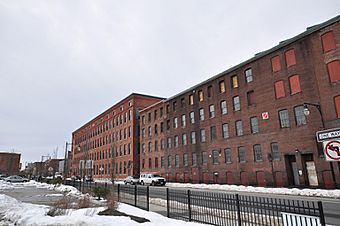Harding-Winter Street Manufacturing District facts for kids
Quick facts for kids |
|
|
Harding-Winter Street Manufacturing District
|
|
 |
|
| Location | 28-88 Winter St., 28-48 Water St., and properties on Pond and Winter Sts., Worcester, Massachusetts |
|---|---|
| Built | 1870 |
| Architectural style | Late Victorian |
| MPS | Worcester MRA |
| NRHP reference No. | 80000543 |
| Added to NRHP | March 05, 1980 |
The Harding-Winter Street Manufacturing District is a special area in Worcester, Massachusetts. It's like a time capsule, showing us what factories looked like in the 1800s! This district has seven old brick factory buildings. They were built a long time ago, between 1870 and 1898.
This area is a small part of a much bigger factory district that used to be in Worcester. Over time, many of the old buildings were taken down. New roads, like Interstate 290, were built. But these seven buildings survived! They show us how important manufacturing was in Worcester's past.
The district is located near Pond Street, Harding Street, Water Street, and Winter Street. It was added to the National Register of Historic Places in 1980. This means it's a very important historical place!
How the Area Grew
Long ago, in the 1850s, a street called Harding Street was made. They built it by filling in part of the Blackstone Canal. This area then became a busy center for making shoes.
Important Factories in the District
Three of the buildings in the district were built in 1870. They were made for the Walker Shoe Company. This company was started in 1862 by two brothers. They made heavy boots and were one of the first big shoe makers in Worcester. Many future shoemakers learned their skills there.
Another building was built in 1890 for the Hill Envelope Company. This company was started in 1848 by a person who invented a machine to fold envelopes! Later, this company became part of US Envelope. They were still working in the building in 1980.
Other factories in the district made different things. One made more boots, another made underwear, and one even made beautiful stained glass windows! These buildings tell the story of Worcester's busy industrial past.



